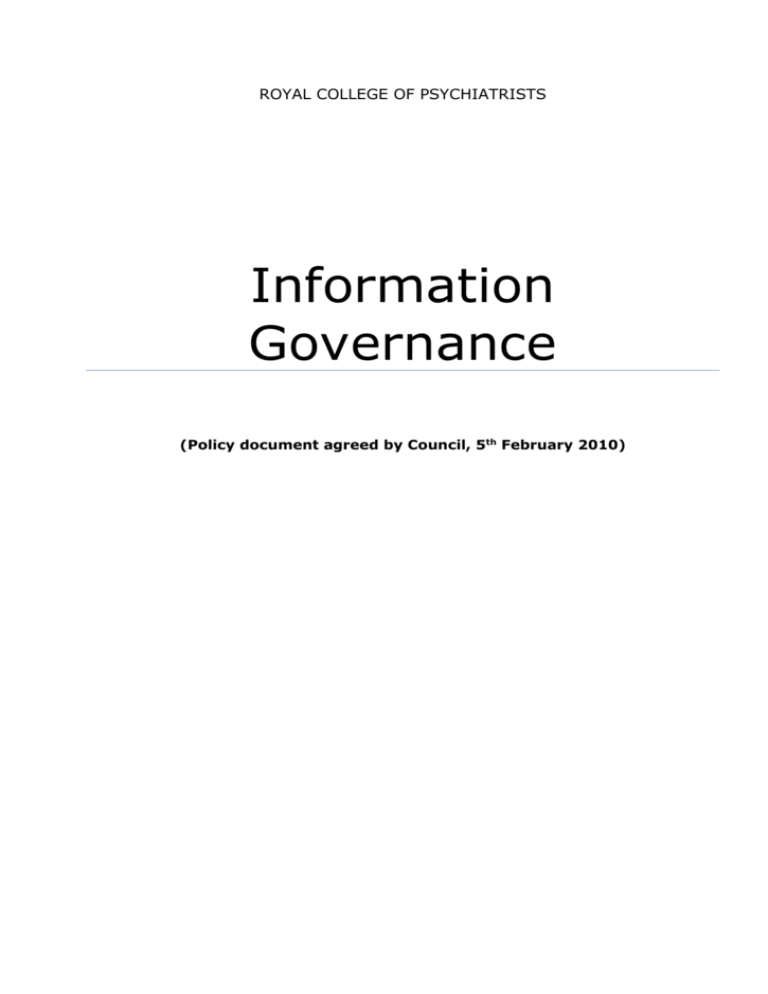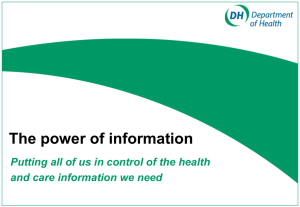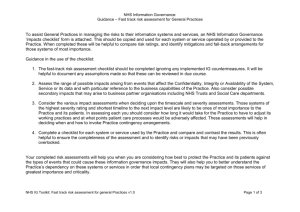Information Governance Policy - Royal College of Psychiatrists
advertisement

ROYAL COLLEGE OF PSYCHIATRISTS Information Governance (Policy document agreed by Council, 5th February 2010) Contents Introduction ..................................................................................... 3 Context and definitions ................................................................... 3 Legal requirements and other requirements ...................................... 4 What may NHS organisations need to know from the College?............. 6 Generic Statement addressing these issues ....................................... 6 Data Collection ................................................................................. 6 Checking information ..................................................................... 6 Data Storage ................................................................................... 7 Data Access .................................................................................. 7 Web Servers ................................................................................. 7 Back up of information held on the server ......................................... 7 Anti virus ...................................................................................... 8 Desk top computers ....................................................................... 8 Mobile devices ............................................................................... 8 Hard copies ................................................................................... 8 Data sharing/transference ................................................................. 8 Data Retention .............................................................................. 9 Staff Responsibilities ......................................................................... 9 Appendix 1 –Information Governance Project Checklist ....................... 10 2 Introduction The Royal College of Psychiatrists takes extremely seriously its responsibilities regarding the safe, effective and appropriate use both of its own data and of data which it processes on behalf of other and partner organisations. These partner organisations include the NHS, other health and social care organisations, the Department of Health and the Post Graduate Deaneries. During the course of its work, the College Centre for Quality Improvement manages information provided by very many health and social care organisations. It was therefore keen that College policies demonstrate to these external partners that the College meets the appropriate standards in terms of information governance. This is frequently a requirement of contracts that the CCQI makes with the Department of Health and other funding bodies. Staff from the CCQI and the Membership Relations Department have worked together to produce this draft. The document sets standards for information governance and defines good practice in meeting these standards. Its purpose is to provide College staff with a comprehensive guide to what they should be doing, how and why. The particular focus is on information governance with regard to NHS data. Although the document will be most relevant to the work of the CCQI due to the nature of its work, it is a whole College policy and other Departments must take account of it when processing patient or other NHS data. All staff should study this document, ask for clarification if necessary, complete the checklist appended when initiating a project with a NHS organisations, and use the generic statements set out in contractual arrangements with partner organisations. Context and definitions Information Governance is a framework for handling personal information in a confidential and secure manner to appropriate ethical and quality standards. Ensuring that information is obtained fairly and lawfully, recorded accurately and reliably, held securely and confidentially, used effectively and ethically and shared appropriately and legally. Personal data (see the College’s Data Protection Policy for full details) means any information which can identify a living person, and which is held on, or with the intention of transferring it to, a database or filing system (whether paper or electronic) which would enable the information to be retrieved. Examples of personal data that might be collected by the CCQI are names and contact details of any one with whom they interact in other organisations. Patient identifiable data might include anything which could identify a patient (for example name, address, post code, date of birth, NHS number, local patient identifiable code, or otherwise. 3 Sensitive data – the Data Protection Act defines certain data as “sensitive”. In this context this is likely to mean data about an identifiable individual’s medical condition. Examples of sensitive data that might be collected by the CCQI are types of medication or treatment received. Confidential data / information – information may be confidential even where it is not within the terms of the Data Protection Act, in that it is not intended for public disclosure. Any information which identifies a NHS Trust or organisation would fall into this category. Examples of confidential information that might be managed by the CCQI are local reports about individual services; benchmarking data that identify participating services in a national clinical audit that the participating services have not agreed to share widely. Legal requirements and other requirements In common law (which by definition is case law, and not codified in one document) there is a general duty of confidentiality. All NHS organisations and those carrying out functions on behalf of the NHS have this common law responsibility of observing the confidentiality of patients and the highest professional and ethical standards in regard to confidentiality. This is likely to involve meeting standards which are more rigorous than the Data Protection Act (see below). The Data Protection Act 1998 governs all aspects of collecting and processing personal data. The College’s Data Protection Policy and Procedures are available at (www.rcpsych.ac.uk/docs/DataProtectionPolicyJuly2009.doc) and the College’s Data Protection Officer is Elizabeth Atkinson (latkinson@rcpsych.ac.uk) and she is happy to help and advise at any time. The eight principles of Data Protection are that personal data must be: fairly and lawfully processed processed for specified and lawful purposes and not in any manner incompatible with those purposes adequate, relevant and not excessive accurate and kept up to date no kept for longer than is necessary processed in line with the data subjects’ rights secure not transferred to countries outside the European Economic Area without adequate protection The Freedom of Information Act 2000 – the College is not a public body under the terms of this Act and thus not generally subject to it. However, some contracts that the College enters into that involve the College managing data on behalf of a public body (such as the NHS) require the College to enable that public body to discharge its responsibilities under the Act. This effectively makes the College subject to the Act with regard to that work. 4 The NHS Code of Confidentiality- the NHS is required to comply with this document, published by the Department of Health and therefore it is of relevance to partner organisations such as the College. Caldicott Principles- six Caldicott principles apply to patient information: 1. 2. 3. 4. Justify the purpose(s) for using confidential information. Only use patient identifiable information where absolutely necessary Use the minimum patient identifiable information that is required Access to patient identifiable information should be on a strict need to know basis 5. Everyone with access to identifiable information must understand their responsibilities 6. Understand and comply with the law The ISO standards are a series of standards relating to the management of information security and underpin the data protection act and Caldicott principles. BSI / ISO Standards – the key standard is ISO/IEC 27001:2005 This standard requires that management: Systematically examines the organization's information security risks, taking account of the threats, vulnerabilities and impacts; Designs and implements a coherent and comprehensive suite of information security controls and/or other forms of risk treatment (such as risk avoidance or risk transfer) to address those risks that it deems unacceptable; and Adopts an overarching management process to ensure that the information security controls continue to meet the organization's information security needs on an ongoing basis. 5 What may NHS organisations need to know from the College? They may ask for: What data are being collected or requested The full name of the organisation and the person responsible for collecting the data How data will be transferred and whether this is electronically, and if so precisely how, or on paper Who will have access to the data How service users will be contacted and how consent will be obtained Where the data will be stored, and what measures are in place to protect it If the data are on a computer, whether there is access via a network How long the data will be stored At the end of this period, how will the data be disposed of and who will have responsibility for this Generic Statement addressing these issues It is recognised that this generic statement may need enhancement in relation to specific projects and customer requirements. If this is needed you should discuss the issues with the appropriate Director and form a view on where to see appropriate advice, this could be the information security or information governance manager of the relevant trust. No item in this statement should be omitted or altered without such discussion. Data Collection The amount of identifiable, confidential and sensitive data collected from service users or services should be kept at a minimum, and must only be used for the purpose stated at the time of collection. Electronic data can be collected through secure sections of the college website (https://), using a bank level security https certificate (128 bit encryption). This encrypts data and secure identification of the server. These sections are accessed via usernames and passwords. Forms, whether paper or online, which collect personal data must always contain the short version of the College Data Protection statement. Checking information Regular and appropriate validation checks will be carried out to ensure the quality and integrity of project data. 6 Data Storage All identifiable, confidential and sensitive data once received must be kept securely and confidentially. Sensitive data are stored in any of the following locations: A restricted area of an RCPsych server On a password protected and encrypted RCPsych issued laptop (PGP software) On an encrypted RCPsych issued memory stick (AES 256 BIT military level security) Sensitive data will not be stored in any of the following locations: Computer hard drives Personal network drives Any mobile devise not issues by RCPsych Non restricted areas of the RCPsych servers. Data Access Access to identifiable/confidential and sensitive data is restricted to the identified project team Members and the head of centre, director and appropriate clinical leads. User names and passwords should meet the standards specified in the NHS Code of Confidentiality, namely: At least seven characters At least one numeral or special character At least two alphabetic characters At least one upper and one lower case character Not similar to a login or user id Not shared with others except where individuals are specifically so authorised. Web Servers RCPsych web servers are subject to physical access restriction, including 100% supervision by RCPsych staff of any contractors required to work in such areas. Monitoring software is in place to ensure that no unauthorised access to servers occurs. Back up of information held on the server All the College’s servers are backed up on a weekly basis to ensure that should a server fail a recent copy of the content can be recovered. The back-up tapes are sent to other College and are encrypted, transported in padlocked strong boxes, signed for on arrival and stored in fireproof safes. 7 Anti virus Anti virus and anti spam software of the highest industry standard is used to protect the information held on RCPsych servers. Servers are also protected by firewalls and anti-hacking software Desk top computers All individuals should lock their computers when they leave their desks and initiate the automatic lock-out facility so that the computer locks itself after 5 minutes of not being used. Mobile devices All College laptops, together with all PCs in Divisional Offices are protected by advanced encryption software. All College memory sticks are encrypted and College Blackberries are password protected. Hard copies A clear desk policy should be in place. All paperwork containing sensitive/ confidential information must be locked in secure storage when not in use. Access to this storage is restricted to the project team. Data sharing/transference Ownership of project information will be clarified in advance of a project commencing, and project leads will be responsible for setting out, as above, with whom and by what means information will be shared and transferred. The Royal College of Psychiatrists will aim to offer a range of options to its partner organisations, and to agree in advance of commencement of a project the option or options which are most suitable. These options will include: Use of a SFTP Client (such as Filezilla) Transfer by email of zipped 256 AES encrypted files, between nhs.uk or nhs.net email addresses and other email addresses, the specification of which must be agreed and logged in advance. Transfer by secure email, when this facility is available Transfer of information which is confidential or sensitive will not take place via text message. If information is transferred by fax, this will be sent only to and from areas secured from public view and with advance notification and with confirmation of receipt. If information sent is sent by post it will be mailed only to named recipients, and marked “Private and Confidential, Addressee Only”, where possible it should also be sent as tracked mail. 8 Data Retention The College’s Records management Policy should be adhered to for all standard items (minutes of meetings, financial information etc). Retention policy for none standard items i.e. Quality Improvement project data, is currently under development. A decision about how long raw data from research/QI initiatives should be held must be made at the time that the work is initiated. This should be for a minimum of 5 years after the end of the project. This data will then be disposed of inline with instructions form the Contractor. All laptops are locked in secure storage whilst on site, once a laptop or PC is no-longer usable the hard-drives are striped from the casing and stored in the Safe. Appropriate care must be taken when laptops are in use outside of College premises, for example lap tops should not be left in parked cars. Staff Responsibilities It is the responsibility of all Staff to ensure that they have read this policy and comply with the processes that it outlines. Managers should complete the Information Governance checklist (Appendix 1) at the initiation of each new project and once a year for ongoing projects to ensure continued compliance on behalf of their project team. 9 Appendix 1 –Information Governance Project Checklist When was the last time you read the Information Governance Policy? _______ Data Collection Did you identify what information you require? Did you state why you need the information? Is the information collected via the College website? Is it collected in by paper form? Are there any identifiable data included? Does the data collection tool contain the Colleges’ Data Protection Policy? Data Storage If you collect your data in an electronic format are they stored in a restricted area of the server? If you collect your data in an electronic format are they stored in an encrypted RCPsych laptop? If you collect you data in an electronic format are they stored in an encrypted RCPsych memory stick? Do you lock out of your screen every time you are away from your desk? If you collect you data in hard copy do you lock them away in secure storage when not in use? Do you clear your desk and lock documents away when you are away from your desk? Access to Data Is your computer/laptop/ memory stick password protected? Is your password up to NHS Code of Confidentiality standard? Is access to documentation (electronic or paper) restricted to your project team? Are all storage facilities used for paper sensitive documents secure? Are the keys to these storage facilities kept in a secure central location so that all members of the project team have access? Data Sharing/transfer Have you outlined who will be allowed to access the information the project has collected? Have you reviewed the appropriate options for transferring data to approved persons? Have you identified the most appropriate and secure data transfer option in each instance? If you would like training on Information Governance please discuss this with your line manager. 10






